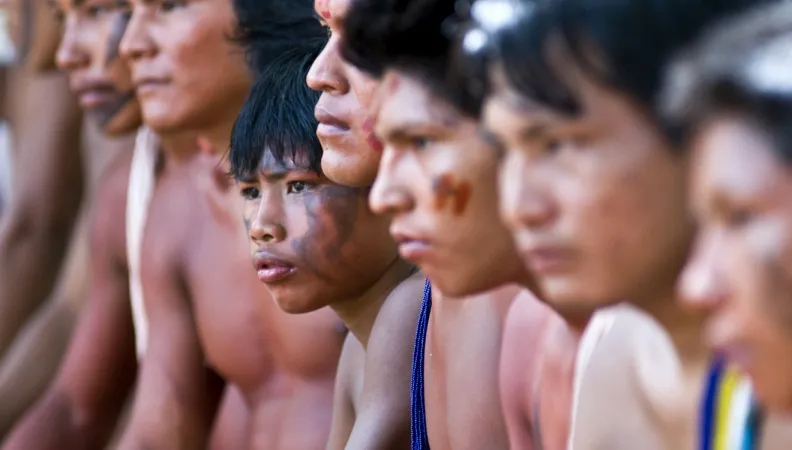Share the page
Protecting Biodiversity: the Key Role of Indigenous Communities
Published on

Worldwide, an estimated 400 to 500 million Indigenous people occupy 20% of the earth’s territory. Yet unsustainable development has caused not only the displacement of countless people, but also the destruction of much of the biodiversity on which they - and the world - depend. With Indigenous people playing a crucial role in the protection of the environment, AFD and its partners are continuing to support them, particularly in the Amazon.
The Amazon covers an area of 5.5 million km2 and as home to about 10% of the world’s known biodiversity, it’s often referred to as the “green lungs of the Earth.” But this sanctuary of biodiversity faces serious threats. Unsustainable agricultural practices and extractive activities such as illegal mining have led to serious deforestation, resulting in the loss of about one fifth of this rain forest over the past 50 years. Other factors such as pollution and forest fires are also major challenges according to WWF France. These threats are exacerbated by environmental policies that have become weaker and lack of respect for the rights of indigenous peoples.
Since 2021, the French Facility for Global Environment (FFEM) has actively supported the implementation of the TerrIndigena project, which adds to the ongoing support provided by AFD.
The goal of this initiative is to protect more than 17 million hectares of indigenous land in three countries of the Amazon basin: Ecuador, Colombia, and Brazil.
TerrIndigena has several focuses: it bolsters governance, monitors the state of forests and the pressures suffered locally, and develops sustainable economic activities that respect the ancestral traditions of indigenous communities.
Indigenous people’s close relationship with nature
“The main objective of this project is to make sure that the rights of communities are respected and that their lands are fully recognized,” says Karen Colin de Verdière, Project Manager at AFD’s Agriculture and Biodiversity Division. “In this way, communities will be able to continue to sustainably manage their land and protect the rain forest and its biodiversity.”
Indigenous people are crucial for preserving the Amazon rain forest, as the conservation strategies they have developed over long periods combine biodiversity preservation with their socioeconomic needs. Their close relationship with nature, their traditional lifestyle, and their in-depth knowledge of local ecosystems are valuable assets in maintaining the ecological balance of the region.
TerrIndigena is committed to protecting these vital territories and preserving the Amazon’s unique biodiversity. To do so, it works with 18 indigenous organizations and local partners including the Gaia Amazonas Foundation (Colombia), the EcoCiencia Foundation (Ecuador) and Instituto de Pesquisa e Formação Indígena – IEPE (Brazil). The initiative is also helping to strengthen the rights and respect of indigenous cultures, all the while promoting sustainable development and the reduction of inequalities among these peoples.
Support for 16 indigenous territories
Patricia Navas, TerrIndigena’s Regional Coordinator, reports that the initiative has produced notable progress in governance, community surveillance systems, and sustainable economic initiatives for the indigenous peoples involved in the project.
“The project has already borne fruit,” says Patricia Navas, TerrIndigena’s Regional Coordinator, “It benefits 16 indigenous territories with a total area of 17.5 million hectares, directly affecting 3,777 people. It has strengthened monitoring capacities within indigenous communities, enabling 113 indigenous persons to develop their skills to monitor pressures, threats, and changes in forest cover.”
The joint efforts by partner organizations and indigenous communities are proof of the importance of working together for the preservation of the Amazon’s vital forests and unique biodiversity. This collaborative approach has also inspired other indigenous peoples in South America and has helped confirm that the Amazon is a region of great ecological and cultural diversity that’s being preserved thanks to the ancestral knowledge of indigenous peoples and local communities.
Cross-matching scientific data and ancestral knowledge
According to Stéphanie Bouziges-Eschmann, Secretary General of the FFEM, the innovation of this project is largely based on cross-matching scientific and satellite data with the ancestral knowledge of local communities. In this way, we can gain unprecedented knowledge of the state of degradation of the Amazon rain forest and the species that live there. It’s a respectful and participatory approach that helps strengthen the capacities of local communities and preserve their cultural heritage while protecting the environment.
AFD is providing additional funding for Phase 2 of the project, whose launch was announced at the UN Biodiversity Conference (COP15) in Montreal in December 2022. This new step marks significant progress in the preservation of the Amazon and the recognition of indigenous peoples’ rights. Phase 2 should consolidate the progress already made and open up promising new prospects for the future of the region.
